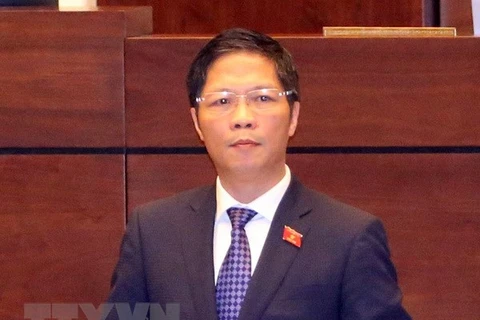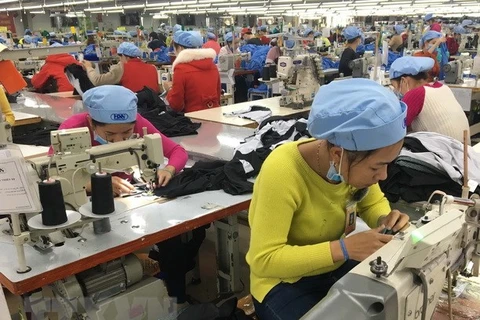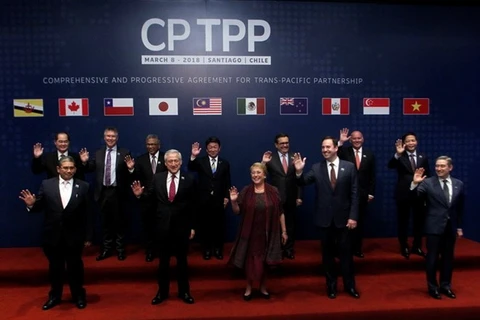 CP TPP will bring in huge economic benefits for Vietnam, says WB report - Illustrative image (Source: VNA)
CP TPP will bring in huge economic benefits for Vietnam, says WB report - Illustrative image (Source: VNA) Hanoi, (VNA) – The Comprehensive and Progressive Agreement for Trans-Pacific Partnership (CP TPP) will bring in huge economic benefits for Vietnam, as according to a new World Bank report released on March 9 amid the fresh signing of the agreement by Vietnam and 10 other countries.
According to the report titled “Economic and Distributional Impacts of Comprehensive and Progressive Agreement for Trans-Pacific Partnership: The Case of Vietnam”, multilateral trade agreements like the CP TPP will help boost Vietnam’s investment and export driven growth model.
“Even under conservative assumptions, the report estimates that CP TPP would increase Vietnam’s GDP by 1.1 percent by 2030. Assuming a modest boost to productivity, the estimated increase of GDP would amount to 3.5 percent from CP TPP,” said Ousmane Dione, World Bank Country Director for Vietnam.
Sebastian Eckardt, the World Bank Lead Economist for Vietnam, said that the deal will directly benefit Vietnam, from trade liberalisation and improved market access.
It will also help stimulate and accelerate domestic reforms in many areas, he stated, adding that delivering commitments under the CP TPP will contribute in promoting transparency and supporting the creation of modern institutions in the country.
All income groups are expected to benefit from this new agreement, although higher-skilled workers in the top 60 percent of the income distribution may reap more. In addition, the anticipated increase in FDI is expected to lead to a further expansion of services sectors and boost productivity growth. It will create opportunities for domestic private firms to integrate into global value chains and promote the development of the SME sector.
[Minister: CPTPP reflects Vietnam’s global integration]
The CP TPP is expected to stimulate reforms in such areas as competition, services (including financial services, telecommunications, and temporary entry of service providers), customs, e-commerce, environment, government procurement, intellectual property, investment, labor standards, legal issues, market access for goods, rules of origin, non-tariff measures, and trade remedies.
The report is assisted by the Australia – World Bank Group strategic partnership which supports Vietnam’s development agenda through technical assistance, capacity building, and analytical work.
“Together with the World Bank, we are committed to helping Vietnam take advantage of the substantial economic opportunities created through CP TPP,” Australian Charge d’Affaires Rebecca Bryant said. “This includes assistance to enhance competitiveness, reduce trade barriers, and improve connectivity”.
The official signing of CP TPP took place in Santiago de Chile on March 8 (local time), with the participation of representatives from 11 member countries, namely Chile, Australia, Brunei, Canada, Malaysia, Mexico, Japan, New Zealand, Peru, Singapore and Vietnam.
CP TPP was launched a year ago after the US withdrew from the Trans-Pacific Partnership (TPP) agreement.
The content of CP TPP was basically unchanged from the original TPP with 8,000 pages, except for the suspended implementation of 22 provisions mainly related to intellectual property. It sets high criteria in numerous fields, including labour, the environment, intellectual property, digital economy and cyber security.
The official signing of the pact will facilitate the promotion of economic growth and job generation, poverty reduction, and improvement of people’s living conditions. With its commitment to market opening, CP TPP delivers a strong message against protectionism, while proving that an opening economy will benefit member nations, according to experts.
The pact will create one of the world’s largest free trade blocs with a combined market of 499 million people and GDP of around 10,100 billion USD, accounting for 13.5 percent of the global GDP.
The pact will come into force 60 days after it is fully ratified by at least six of the 11 members. -VNA
VNA























